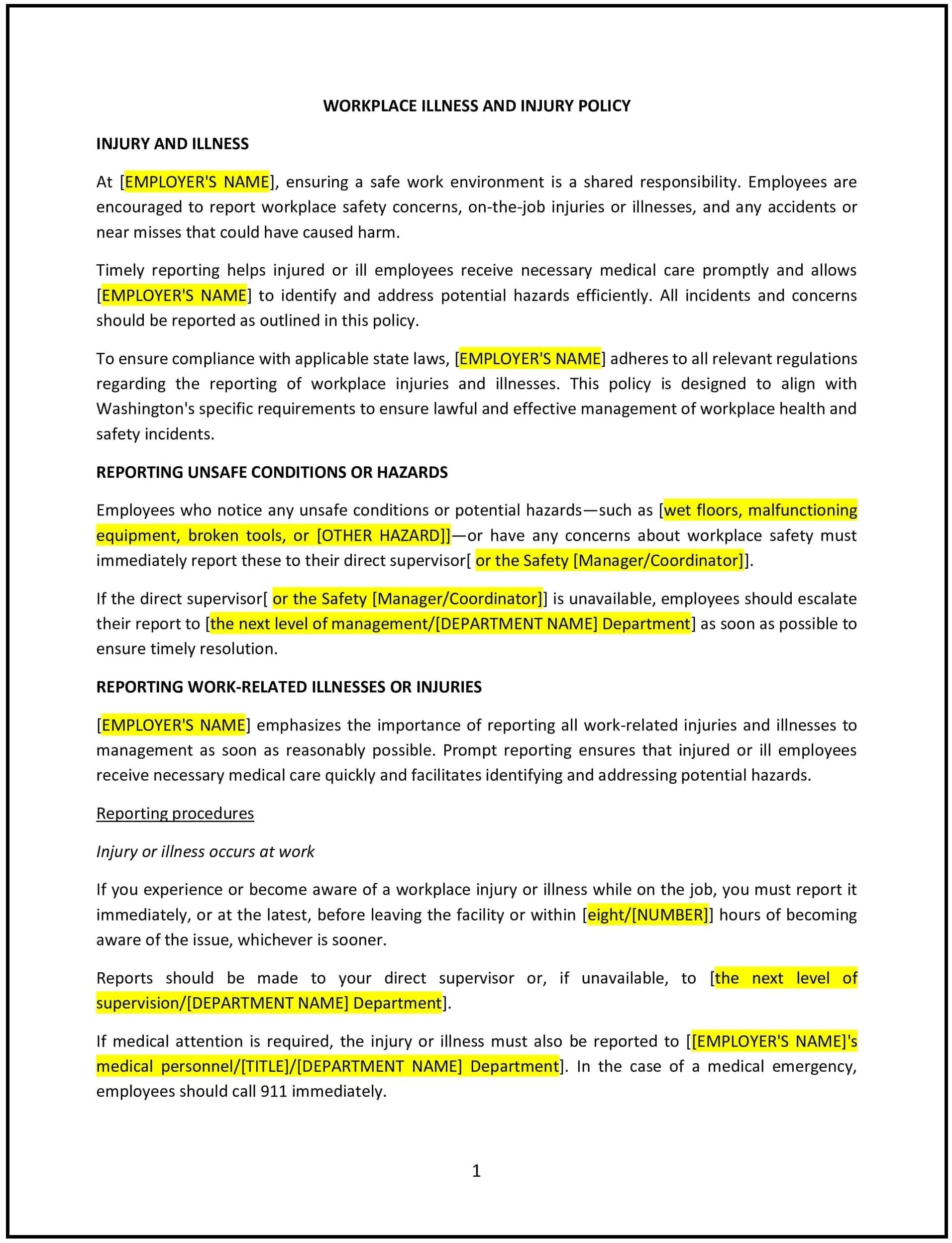Workplace illness and injury policy (Washington): Free template
Got contracts to review? While you're here for policies, let Cobrief make contract review effortless—start your free review now.

Customize this template for free
This workplace illness and injury policy is designed to help Washington businesses manage and respond to employee illnesses and injuries that occur during work or impact an employee's ability to work. The policy outlines the company’s responsibilities for providing a safe work environment, procedures for reporting and documenting injuries or illnesses, and the types of leave and accommodations available to employees. The policy also ensures that the company takes appropriate steps to manage workplace health and safety in accordance with Washington state laws.
By adopting this policy, businesses can promote a healthy and safe work environment, reduce the risk of illness and injury, and ensure proper procedures are followed to manage health-related incidents in the workplace.
How to use this workplace illness and injury policy (Washington)
- Define workplace illness and injury: The policy should clearly define what constitutes workplace illness and injury, including both physical injuries and occupational illnesses. This may include anything from minor injuries like sprains to more serious conditions such as respiratory diseases, repetitive stress injuries, or infections contracted in the workplace.
- Establish reporting procedures: The policy should specify how employees should report illnesses and injuries, including the timeline for reporting and the steps to follow. Employees should be instructed to inform their supervisor or HR as soon as possible if they experience an illness or injury while at work.
- Outline medical treatment and first aid: The policy should detail the company’s procedures for providing initial medical treatment or first aid in the event of an illness or injury. It should also specify how employees can access healthcare services if necessary and whether the company will cover any medical costs.
- Address leave options and accommodations: The policy should clarify the types of leave available to employees who are ill or injured, such as sick leave, disability leave, or workers’ compensation. It should also provide guidance on accommodations that may be available for employees who need to take time off or adjust their work duties due to illness or injury.
- Ensure compliance with Washington state laws: The policy should comply with Washington state laws related to workplace health and safety, including the Washington Industrial Insurance Act and the state’s workers’ compensation program. The policy should also address the company’s responsibility to comply with the Occupational Safety and Health Administration (OSHA) guidelines.
- Provide support for employees returning to work: The policy should include guidelines for employees returning to work after an illness or injury, including any necessary accommodations or modified duties. It should outline the process for determining when employees are fit to return to work and how to handle a return-to-work plan.
- Review and update regularly: Periodically review and update the policy to ensure it remains compliant with Washington state laws, federal regulations, and any changes in company operations. Regular updates will help ensure the policy stays relevant and effective.
Benefits of using this workplace illness and injury policy (Washington)
This policy offers several benefits for Washington businesses:
- Promotes employee health and safety: By outlining clear procedures for handling illness and injury, the policy helps businesses provide a safe work environment and minimize the risk of workplace-related health issues.
- Reduces legal risks: A comprehensive policy supports compliance with Washington state laws, including workers’ compensation and health and safety regulations, reducing the risk of legal liabilities or lawsuits arising from workplace injuries or illnesses.
- Enhances employee well-being: Offering clear guidance and support for employees who are ill or injured helps reduce stress and improves overall well-being, leading to higher employee morale and retention.
- Improves business continuity: By addressing illness and injury in a structured and efficient manner, the policy ensures that employees can access the support they need without significant disruptions to business operations.
- Increases employee trust: When employees know that their health and safety are a priority, they are more likely to trust the company and feel supported in times of illness or injury.
- Fosters a culture of safety: This policy helps reinforce the company’s commitment to workplace safety and shows employees that their well-being is valued, which can reduce the risk of future incidents.
Tips for using this workplace illness and injury policy (Washington)
- Communicate the policy clearly: Ensure that all employees are aware of the workplace illness and injury policy and understand how to report illnesses or injuries, as well as what steps they need to take if they are injured or become ill while at work.
- Provide training on safety procedures: Offer regular training for employees on workplace safety, including how to prevent injuries, proper use of equipment, and emergency response procedures. This will help reduce the occurrence of workplace illnesses and injuries.
- Create a supportive return-to-work process: Ensure that employees returning from illness or injury are provided with the necessary accommodations or modified duties to support a smooth transition back to work. The policy should outline how this process works and who is involved.
- Track workplace incidents: Keep accurate records of all reported workplace illnesses and injuries, including the nature of the illness or injury, the action taken, and any accommodations provided. This will help the company identify trends and make improvements in workplace safety.
- Review and update regularly: Periodically review the policy to ensure it remains compliant with Washington state laws, federal regulations, and any changes in the company’s operations. Regular updates will help keep the policy relevant and effective.